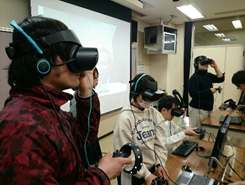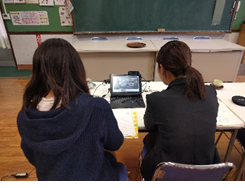How technology helps special classes teachers
The teacher does not know his subject well enough, he should be able to perfectly understand the students and their difficulties in mastering the material in order to correctly convey knowledge. And if the children are special? If their health is impaired? How can a teacher understand their state and ability to learn? Perhaps, technology will come here too. For example, such a virtual reality environment has already appeared, which, in the course of viewing a spherical video, will make it possible to feel the state of children with autism. How a special head-mounted display with the support of VR technology will help teachers better know the difficulties that children face with health problems, and also pass on their knowledge to colleagues, we are telling today. Those who are interested, I ask under the cat

So, teachers who work in special classes can be assisted by special technical support for a deeper understanding of the nature of students' health disorders. For example, virtual reality technology can be used to simulate the difficulties faced by children, and a spherical camera will allow you to conduct training by remotely attending lessons, a video conferencing system is useful for distance learning consultations, in which teachers can receive the necessary support from industry experts. It is these three techniques that Fujitsu and Kagawa University of Japan have chosen to study using VR and telepresence technologies. And now about everything in order.

In addition to evaluating the effectiveness of these 3 methodologies, an effective model of using ICT for inclusive education will be evaluated.
Education systems in special classes do not have enough experience to train teachers, schools and teachers do not sufficiently understand the nature of student health disorders; it is especially difficult to master new approaches for those who work in remote regions. To solve these problems, Kagawa University is conducting an experimental study using ICT. Teachers and support staff can learn more about the nature of children's health problems, and teachers working in remote schools will be able to remotely receive support from industry experts.
The study will involve about 50 teachers and staff from 5 schools in Japan. They are waiting for 3 experiments: 1. Virtual reality technology will be used to simulate the state of the child; 2. Remote attendance training using a spherical camera capable of capturing video with a 360-degree viewing angle; 3. Distance learning consultations, in which teachers will receive the necessary information and expert advice through a video conference system. These experiments will support the teachers, as they will provide material for a deeper understanding of the nature of the students' health disorders. In addition to assessing the effectiveness of these 3 methodologies, the study will evaluate the effective model of using ICT for inclusive education.
Description of the experimental study
1. VR technology allows you to better understand the nature of the health problems and the difficulties that children face.

Evaluating the nature of health problems using the virtual reality system
Professors Satoshi Sakai (Satoshi Sakai) and Eiichi Miyazaki from the faculty of education at Kagawa University and other research teams are developing a virtual reality environment that will allow teachers to better understand the difficulties faced by children with impaired health. The special head-mounted display with the support of VR technology will allow you to experience the hypersensitivity experienced by children with autism as they watch a spherical video from the British National Autistic Society.
2. Remote attendance of lessons with a camera capable of capturing video with a 360 ° viewing angle.

Remote training using a spherical camera
Video for students who need special support is captured with a special fully spherical camera installed in the classroom. Experts begin to view the video using a special head-mounted display, which creates a feeling of full presence and allows teachers to give appropriate recommendations for conducting classes.
3. Remote consulting on teaching issues by organizing a videoconference.
Researchers connect Cisco TelePresence video conferencing systems and Cisco Webex Meetings webinar service using Fujitsu Managed Infrastructure Service FENICS II Universal Connect, a Fujitsu network service that allows you to create a system of remote support for teachers. The study will show how effective the remote consultations are.

Experts offer remote consulting services.
Future Developments
Kagawa University and Fujitsu plan to widely disseminate information about the results of a study of Japanese school environments. In addition, Fujitsu will develop ICT services based on the research findings in order to ensure an inclusive and good quality of education and development of lifelong opportunities for all.

So, teachers who work in special classes can be assisted by special technical support for a deeper understanding of the nature of students' health disorders. For example, virtual reality technology can be used to simulate the difficulties faced by children, and a spherical camera will allow you to conduct training by remotely attending lessons, a video conferencing system is useful for distance learning consultations, in which teachers can receive the necessary support from industry experts. It is these three techniques that Fujitsu and Kagawa University of Japan have chosen to study using VR and telepresence technologies. And now about everything in order.

In addition to evaluating the effectiveness of these 3 methodologies, an effective model of using ICT for inclusive education will be evaluated.
Education systems in special classes do not have enough experience to train teachers, schools and teachers do not sufficiently understand the nature of student health disorders; it is especially difficult to master new approaches for those who work in remote regions. To solve these problems, Kagawa University is conducting an experimental study using ICT. Teachers and support staff can learn more about the nature of children's health problems, and teachers working in remote schools will be able to remotely receive support from industry experts.
The study will involve about 50 teachers and staff from 5 schools in Japan. They are waiting for 3 experiments: 1. Virtual reality technology will be used to simulate the state of the child; 2. Remote attendance training using a spherical camera capable of capturing video with a 360-degree viewing angle; 3. Distance learning consultations, in which teachers will receive the necessary information and expert advice through a video conference system. These experiments will support the teachers, as they will provide material for a deeper understanding of the nature of the students' health disorders. In addition to assessing the effectiveness of these 3 methodologies, the study will evaluate the effective model of using ICT for inclusive education.
Description of the experimental study
1. VR technology allows you to better understand the nature of the health problems and the difficulties that children face.

Evaluating the nature of health problems using the virtual reality system
Professors Satoshi Sakai (Satoshi Sakai) and Eiichi Miyazaki from the faculty of education at Kagawa University and other research teams are developing a virtual reality environment that will allow teachers to better understand the difficulties faced by children with impaired health. The special head-mounted display with the support of VR technology will allow you to experience the hypersensitivity experienced by children with autism as they watch a spherical video from the British National Autistic Society.
2. Remote attendance of lessons with a camera capable of capturing video with a 360 ° viewing angle.

Remote training using a spherical camera
Video for students who need special support is captured with a special fully spherical camera installed in the classroom. Experts begin to view the video using a special head-mounted display, which creates a feeling of full presence and allows teachers to give appropriate recommendations for conducting classes.
3. Remote consulting on teaching issues by organizing a videoconference.
Researchers connect Cisco TelePresence video conferencing systems and Cisco Webex Meetings webinar service using Fujitsu Managed Infrastructure Service FENICS II Universal Connect, a Fujitsu network service that allows you to create a system of remote support for teachers. The study will show how effective the remote consultations are.

Experts offer remote consulting services.
Future Developments
Kagawa University and Fujitsu plan to widely disseminate information about the results of a study of Japanese school environments. In addition, Fujitsu will develop ICT services based on the research findings in order to ensure an inclusive and good quality of education and development of lifelong opportunities for all.
